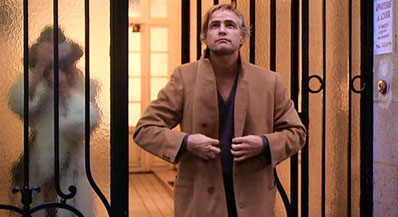The Insert Shot: Last Tango in Paris
Why Bertolucci's Masterpiece Needs and Earns Every Dirty, Filthy Moment
By Tom Houseman
March 8, 2012
Throughout the movie we see Paul using Jeanne to maintain control over his life, taking advantage of her to develop a sense of power and superiority, both of which he lost in his relationship with his wife. Paul becomes more abusive as he senses that he is losing control, but we don't actually see him lose control until he sees his wife in her coffin. This is the scene in which Paul falls apart, admitting all the weakness and helplessness he has been feeling, that we have seen beneath the surface but has never come out. “I might be able to comprehend the universe,” Paul tells her, “but I'll never be able to understand the truth about you. Never.” He admits to her that he is lost and afraid, the sort of admission he could never make to Jeanne. He attempts to assert himself in the situation, verbally assaulting his wife's corpse in the same way he did Jeanne, but he has no power in this dynamic so it is useless. Eventually he is left with no recourse but to break down in tears and beg for forgiveness.
It is at this point that we understand that Paul is completely broken, has lost all control over his own life. He is desperate for a real emotional connection, exactly what he has spent the rest of the movie trying to avoid. Before, he presented himself to Jeanne as strong and impenetrable, but the next time he sees her he is weak, open, and emotional. He opens himself up to Jeanne exactly as she wanted him to, telling her all of the details of his life. He is allowing himself to be vulnerable because he can finally admit to himself that he loves her.
This is the moment that Jeanne realizes what she wants. She has been dealing with a broken man the whole time, but she never realized it because she was so in love with him and so at his mercy. She gave him such total control of herself that she wan't able to see that he had no control over his own life. This is the moment when we see Jeanne grow up. She thought that being with Paul was making her a woman, mostly because of the sex, but she truly becomes a woman when she takes control of her own life, dictating the terms of her relationship. Of course, sex plays a part of this as well. Sitting in the corner of a bar, Jeanne jerks Paul off over his pants. This is the first time in their relationship that Jeanne has been the one in control of a sexual situation. She is pleasuring him, yes, but on her terms. Paul later tries to reassert control in the way he had earlier, but telling her “You're a a crummy looking broad. I don't give a damn if I never see you again.” But his spell has been broken and he has completely lost the power that he had over her.
So why then, does Jeanne shoot Paul at the end of the film? There are a number of theories one could posit. The most obvious is revenge. Having grown up and understood how damaging and terrible what Paul did to her was, and this is how she gets back at him. She has an obvious excuse for the police, in that she could claim self defense and nobody would be able to challenge her. But it is entirely possible that her motivation had less to do with revenge than with wanting to create a new life. A theme throughout Last Tango in Paris is wanting to start over. That is what Paul attempts to do with Jeanne, and at one point he tells her “it's over and then it begins again.” Jeanne doesn't understand what he means, but over the course of this last day with him, she sees how he is trying to start a new life. She makes the same decision, severing her ties to the girl that she used to be. Paul used her sexuality in an attempt to break her, but she makes the choice to be strong and in control. Shooting Paul is her way of beginning again, of reclaiming her strength and power.
Last Tango in Paris is a wild, tumultuous, aggressive movie, but what makes it so powerful is not its looseness, but its rigidity. Watching the film you understand how much control director Bernardo Bertolucci has over the frame, and how he moves the story forward effortlessly. So you can watch the sex scenes and think they are excessive, gratuitous, sacrificing story for the sake of titillation. But such a judgment ignores the insight these sex scenes give us into the fluctuating emotional states of the film's protagonist. How they touch, how they fuck, how they move when they are together. Filmmakers are often told to “show, not tell” when developing their characters. Depicting somebody during their most intimate, most vulnerable moments is the ultimate way to show us all of the secrets they want to keep hidden. Bertolucci understood that when he wrote and directed Last Tango in Paris, and the result is a movie that is not sexy or titillating, but is brutally honest and deeply sad.
Continued:
1
2
3




